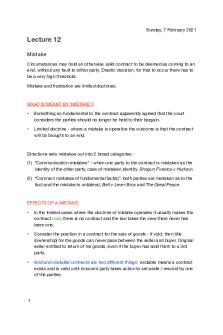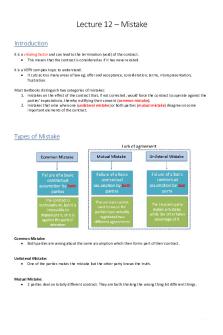Mistake - all lecture notes for topic - exam reviewed PDF

| Title | Mistake - all lecture notes for topic - exam reviewed |
|---|---|
| Author | Emi Walker |
| Course | Contract Law 25 |
| Institution | University of Leicester |
| Pages | 3 |
| File Size | 45.5 KB |
| File Type | |
| Total Downloads | 583 |
| Total Views | 840 |
Summary
Mistake – Semester 1VITIGATING FACTORS: A factor that affects the validity of a contract Void = the contract never existed Voidable = contract exists but is damaged. Can be rescinded on establishing misrepresentation or duress by the victim WHAT IS A MISTAKE: - When a contract is entered into on the...
Description
Mistake – Semester 1 VITIGATING FACTORS: - A factor that affects the validity of a contract - Void = the contract never existed - Voidable = contract exists but is damaged. Can be rescinded on establishing misrepresentation or duress by the victim WHAT IS A MISTAKE: - When a contract is entered into on the basis of a misunderstanding or error on the part of one or both of the contracting parties - Legal consequence – a mistake can lead to a contract being VOID but not all mistakes lead to that COMMUNICATION MISTAKES ABOUT CONTRACT TERMS: - Issue on whether there was a consensus ad idem - Courts determine if there was a meeting of the minds by applying the objective test - If there was an objective agreement, the courts will NOT void the contract if one of them had made a mistake about the contract terms - The objective test o Would the reasonable observed, on the basis of external appearance, think the buyer had agreed to the seller’s terms? o Smith v Hughes – buyer wanted old oats as better for horses, the seller contracted for new oats – held reasonable o Cannot be applied where one party is or ought to be aware that the other party has made a mistake – Hartog v Colin and shields o Cannot be applied where the seller caused the buyer to make the mistake – Scriven brothers v hindley & co MISTAKES OF IDENTITY: - Nemo dat quad non habet – cannot give what you don’t have o As the original contract is void, it never existed which means the rogue never had ownership o When the rogue sold the goods to a third party, they didn’t have ownership either o The original owner will be able to retrieve the goods from the innocent third party Only happens in the original contract is void. If not, the rogue had ownership and could validly transfer it to eh third party and the innocent seller would not be able to get his/her goods back -
Contract is made with rogue face to face
o There is a presumption that the innocent seller intended to deal with the person standing in front of them, regardless of who they claim to be – Philips v brooks Contract not void- - ownership passed to rogue Different if the innocent seller “regarded the identity of the offeree as a matter of vital importance” Ingram v little – sisters selling car, Mr. Hutchinson the rogue agreed to buy, the sisters went to post office to check his identity; his showed the person they were dealing with was of vital importance -
Contract made in writing o Rogue assumed identity of someone who really exists = void Presumed the innocent seller only intended ro desal with the person the rogue was pretending to be Shotgun finance v Hudson – a connection is made with this name in the seller’s mind because they have nothing else to go on Cundy v Lindsay – pretended to be a reputable firm – VOID o Rogue misrepresented his own creditworthiness – not void Situation is different when the rogue has made up a company and made it look respectable. There is no connection in the mind of the seller with anyone but the rogue Kings Norton metal co v edridge – pretended to be a madeup company, not void because the seller intended to seal with the rogue who was pretending to be a fake person
COMMON MISTAKE AS TO FUNDAMENTAL FACTS: - There is consensus ad idem – they are agreeing to the same thing - However, the thing they agree upon is different to what they thought, they were both mistake about the same fact - The common mistake must have been operative at the time they entered into the contract - The test – great peace v tsavlris salvage – lord Philips o Must be a common assumption as to the existence of a state of affairs (both agree to the fact) o Must be no warranty by either party that the state of affairs exists (no promises it exists = breach of contract) o The non-existence of the state of affairs must not be attributable to the fault of either party (must be an innocent mistake) o The noon-existence of the state of affairs must render performance impossible (can the contract still perform?) o The state of affairs may be the existence, or a vital attribute of the consideration to be provided od circumstance which must
subsist if performance of the contractual adventure is to be possible (more possible than impossible)...
Similar Free PDFs

Lecture notes (ALL - EXAM)
- 118 Pages

Mistake - Lecture notes 3
- 3 Pages

Mistake - exam notes
- 7 Pages

PS101 Exam - Lecture notes all
- 38 Pages

Important notes all topic
- 1 Pages

Soc EXAM - Lecture notes All
- 38 Pages

Lecture notes, Mistake of Fact
- 5 Pages

(12) Mistake - Lecture notes 12
- 8 Pages

Lecture notes, lecture All
- 273 Pages

Lecture notes, lecture All
- 243 Pages

Lecture notes, lecture all
- 62 Pages

Lecture notes, lecture All
- 9 Pages

Lecture Notes, Lecture All
- 37 Pages

Lecture notes, lecture ALL
- 101 Pages
Popular Institutions
- Tinajero National High School - Annex
- Politeknik Caltex Riau
- Yokohama City University
- SGT University
- University of Al-Qadisiyah
- Divine Word College of Vigan
- Techniek College Rotterdam
- Universidade de Santiago
- Universiti Teknologi MARA Cawangan Johor Kampus Pasir Gudang
- Poltekkes Kemenkes Yogyakarta
- Baguio City National High School
- Colegio san marcos
- preparatoria uno
- Centro de Bachillerato Tecnológico Industrial y de Servicios No. 107
- Dalian Maritime University
- Quang Trung Secondary School
- Colegio Tecnológico en Informática
- Corporación Regional de Educación Superior
- Grupo CEDVA
- Dar Al Uloom University
- Centro de Estudios Preuniversitarios de la Universidad Nacional de Ingeniería
- 上智大学
- Aakash International School, Nuna Majara
- San Felipe Neri Catholic School
- Kang Chiao International School - New Taipei City
- Misamis Occidental National High School
- Institución Educativa Escuela Normal Juan Ladrilleros
- Kolehiyo ng Pantukan
- Batanes State College
- Instituto Continental
- Sekolah Menengah Kejuruan Kesehatan Kaltara (Tarakan)
- Colegio de La Inmaculada Concepcion - Cebu

